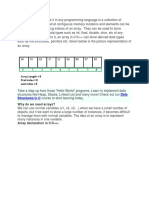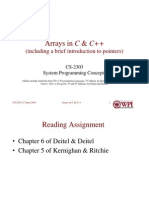0 ratings0% found this document useful (0 votes)
38 views13 pagesArrays in C++
Uploaded by
Zaoui HananeCopyright
© © All Rights Reserved
We take content rights seriously. If you suspect this is your content, claim it here.
Available Formats
Download as PDF or read online on Scribd
0 ratings0% found this document useful (0 votes)
38 views13 pagesArrays in C++
Uploaded by
Zaoui HananeCopyright
© © All Rights Reserved
We take content rights seriously. If you suspect this is your content, claim it here.
Available Formats
Download as PDF or read online on Scribd
You are on page 1/ 13
‘srini2022 21:66, Arrays in CIC+ - GeeksforGeoks
Arrays in C/C++
Difficulty Level: Easy @ Last Updated : 27 Jan, 2022
An array in C/C++ or be it in any programming language is a collection of similar data
items stored at contiguous memory locations and elements can be accessed
randomly using indices of an array. They can be used to store collection of primitive
data types such as int, float, double, char, etc of any particular type. To add to it, an
array in C/C++ can store derived data types such as the structures, pointers etc
Given below is the picture representation of an array,
PPE PEP
I 23 ae | 78
0
« Array Indices
Array Length=9
First Index =0
Last Index=8
Why do we need arrays?
We can use normal variables (v1, v2, v3, ..) when we have a small number of objects,
but if we want to store a large number of instances, it becomes difficult to manage
em with normal variables. The idea of an array is to represent many instances in
one variable
hitps:wwn.geeksforgecks.orgiarrays-in-ccpp ans
71032022 21:56 Arrays in CIC - GoekslorGeoks
Start Your Coding Journey Now!
Note: In above image int a[3]={[0...1]=3}; this kind of declaration has been obsolete
since GCC 2.5
There are various ways in which we can declare an array. It can be done by specifying
its type and size, by initializing it or both
Array declaration by specifying size
oS
Data Structures Algorithms Interview Preparation Topic-wise Practice C++ Java Pyth
// With recent C/C++ versions, we can also
// declare an array of user specified size
int n = 10;
int arr2{n];
Array declaration by initializing elements
c
7/ Array declaration by initializing elements
int arr[] = { 10, 20, 3@, 40 }
a
hitps:wwn.geeksforgeeks.orglarrays-in-ccppy ans.
‘srini2022 21:66, Arrays in CIC#+ - GeeksforGeoks
Start Your Coding Journey Now!
// Array declaration by specifying size and initializing
// elements
int arr[6] = { 10, 20, 30, 40 }
// Compiler creates an array of size 6, initializes first
// 4 elements as specified by user and rest two elements as
// ®. above is same as “int arr[] = {10, 20, 30, 48, @, 0)"
Advantages of an Array in C/C++:
1. Random access of elements using array index
2. Use of fewer line of code as it creates a single array of multiple elements.
3, Easy access to all the elements
4, Traversal through the array becomes easy using a single loop.
5, Sorting becomes easy as it can be accomplished by writing fewer line of code.
Disadvantages of an Array in C/C++:
1. Allows a fixed number of elements to be entered which is decided at the time of
declaration. Unlike a linked list, an array in C is not dynamic.
2. Insertion and deletion of elements can be costly since the elements are needed to
be managed in accordance with the new memory allocation.
Facts about Array in C/C++:
* Accessing Array Elements:
Array elements are accessed by using an integer index. Array index starts with 0
and goes till size of array minus 1
* Name of the array is also a pointer to the first element of array.
hitps:wwn.geeksforgeeks.orglarrays-in-ccppy 33
71032022 21:56 Arrays in CIC - GoeksforGeoks:
Start Your Coding Journey Now!
Example:
c
#include
int main()
t
int arr[5]5
arr[@] = 53
arr[2] = -10;
arr[3 / 2] = 2; // this is same as arr[1] = 2
are[3] = arr[0];
printf ("%d Xd %d %d", arr[o],
arr[1], arr[2], arr[3]);
return 0;
C++ ¥
include
using namespace std;
int main()
t
int arr[5]5
arr[@] = 55
arr[2] = -10;
J/ this is same as arr[1] = 2 a
hitps:wwn.geeksforgeeks.orglarrays-in-ccppy
‘srini2022 21:66,
Start Your Coding Journey Now!
return 5
Output
52-105
No Index Out of bound Checking:
There is no index out of bounds checking in C/C++, for example, the following
program compiles fine but may produce unexpected output when run,
c
// This C program compiles fine
// as index out of bound
// is not checked in Cc.
#include
int main()
{
int arr[2]5
printf("xd ", arr[3])5
printf("%d ", arr[-2])5
return 3
C++
// This C++ program compiles fine
// as index out of bound
// is not checked in Cc.
include
sing namespace std;
int main()
hitps:wwn.geeksforgeoks orglarrays-in-c-cppl
Arrays in CIC#+ - GeeksforGeoks
5113
‘srini2022 21:66, Arrays in CIC#+ - GeeksforGeoks
Start Your Coding Journey Now!
return 5
Output
-449684907 4195777
In C, itis not a compiler error to initialize an array with more elements than the
specified size. For example, the below program compiles fine and shows just
Warning.
#include
int main()
{
// Array declaration by initializing it
// with more elements than specified size.
int arr[2] = { 10, 20, 30, 40, 50 };
return 0;
Warnings:
prog.c: In function 'main':
prog.c:7:25: warning: excess elements in array initializer
int arr[2] = { 10, 20, 30, 40, 58 }5
prog.c:7:25: note: (near initialization for ‘arr')
prog.c:7:29: warning: excess elements in array initializer
int arr[2] = { 10, 20, 30, 40, 5@ };
prog.c:7:29: note: (near initialization for ‘arr’)
prog.c:7:33: warning: excess elem . in array initializer
hitps:wwn.geeksforgeeks.orglarrays-in-ccppy ans,
‘srini2022 21:66,
Start Your Coding Journey Now!
Arrays in CIC#+ - GeeksforGeoks
the program generates compiler error “error: too many initializers for ‘int [2]"".
The elements are stored at contiguous memory locations
Example:
c
// © program to demonstrate that
// array elements are stored
// contiguous locations
#include
int main()
t
MW
MW
MW
MW
We
Ms
MW
an array of 10 integers.
If arr[@] is stored at
address x, then arr[1] is
stored at x + sizeof(int)
arr[2] is stored at x +
sizeof(int) + sizeof(int)
and so on.
int arr[5], 43
printf("Size of integer in this compiler is %lu\n",
sizeof(int));
for (i = 0; i < 53 int)
// The use of '&' before a variable name, yields
// address of variable.
printf("Address arr[%d] is %p\n", i, &arr[i])5
return @;
C++
' C++ program to demonstrate that array elements
/ are stored contiguous locations
iinclude
hitps:wwn.geeksforgeoks orglarrays-in-c-cppl
m3
‘srini2022 21:66,
Start Your Coding Journey Now!
J) address x, then arr[i) is
// stored at x + sizeof(int)
// arr[2] is stored at x +
// sizeof(int) + sizeof(int)
// and so on.
int arr[S], 43
Arrays in CIC#+ - GeeksforGeoks
cout << "Size of integer in this compiler is *
<< sizeof(int) << "\n";
for (i = 0; i < 55 itt)
// The use of '&' before a variable name, yields
// address of variable.
cout <<
‘Address arr[" << i << "] is
using namespace std;
int main()
{
int arr[6]={11,12,13,14,15,16);
JI Way 1
for(int i0;i<6;i++)
cout<
You might also like
- CL103 - Computer Programming - Lab # 03 (Arrays)No ratings yetCL103 - Computer Programming - Lab # 03 (Arrays)20 pages
- Arrays in C & C++: (Including A Brief Introduction To Pointers)No ratings yetArrays in C & C++: (Including A Brief Introduction To Pointers)46 pages
- Properties of Array in C - GeeksforGeeksNo ratings yetProperties of Array in C - GeeksforGeeks12 pages
- Asotić, Din - Arrays in C++ - The Thrid Step in Mastering C++ Programming (2023, Independent) - Libgen - LiNo ratings yetAsotić, Din - Arrays in C++ - The Thrid Step in Mastering C++ Programming (2023, Independent) - Libgen - Li322 pages
- Chapter 4 - Arrays and Strings (Part 1)No ratings yetChapter 4 - Arrays and Strings (Part 1)15 pages
- Array in C++ Programming Language: Bowen University, Iwo NigeriaNo ratings yetArray in C++ Programming Language: Bowen University, Iwo Nigeria14 pages
- What Is An Array?: Introduction To ComputingNo ratings yetWhat Is An Array?: Introduction To Computing24 pages
- Simple Arrays - Two Dimensional, Multidimensional and Dynamic Arrays COMPLETE NOTESNo ratings yetSimple Arrays - Two Dimensional, Multidimensional and Dynamic Arrays COMPLETE NOTES8 pages


























































